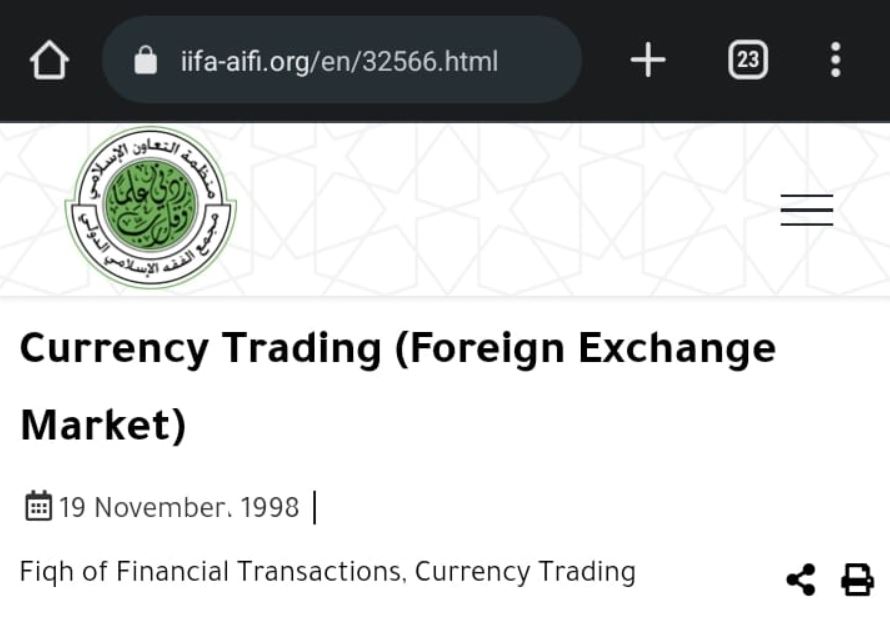In the ever-evolving world of finance, the intersection of Islamic principles and stock forex trading has presented itself as a complex and delicate landscape. For Muslim investors seeking to align their financial pursuits with their religious beliefs, understanding the concept of Islamic fatwa and its implications for stock forex trading is crucial. This article aims to delve into the intricacies of stock forex trading within the framework of Islamic fatwa, providing a comprehensive overview of the topic and offering valuable insights for those navigating this path.

Image: afyan.com
Unveiling Islamic Fatwa and its Significance
Islamic fatwa, an authoritative legal opinion issued by Islamic scholars, serves as a guide for Muslims in their everyday lives, including their financial dealings. When it comes to stock forex trading, Islamic fatwa provides a framework to ensure compliance with the principles of Islamic law (Sharia). The primary objective of Islamic finance is the prohibition of interest (riba), the practice of charging or paying a predetermined amount for the use of money. Additionally, it emphasizes ethical and fair practices, prohibiting activities such as gambling and speculation.
Understanding the Parameters of Islamic Fatwa in Stock Forex Trading
Within the realm of stock forex trading, Islamic fatwa has established specific guidelines to guide Muslim investors. These guidelines are designed to avoid practices that conflict with Islamic principles, such as:
- Short selling: Involving selling shares that one does not currently own, with the intention of buying them back at a lower price and profiting from the difference.
- Margin trading: Borrowing money from a broker to increase trading capital, which may involve paying interest (riba).
- Trading in prohibited industries: Such as alcohol, gambling, or tobacco, which are deemed unethical and unlawful in Islam.
- Excessive speculation: Engaging in highly risky trading practices with the intention of quick gains, which is discouraged by Islamic teachings promoting responsible investment.
Navigating the Labyrinth of Permitted Transactions
While Islamic fatwa restricts certain trading practices, it does not prohibit stock forex trading altogether. Muslim investors can engage in stock forex trading as long as it adheres to the principles of Islamic finance. Permissible transactions include:
- Spot trading: Buying and selling stocks or currency pairs immediately, with no interest charged.
- Forward trading: Entering into contracts for the future delivery of a currency or commodity at a predetermined price, provided that there is an underlying physical transaction.
- Options trading: Acquiring the option to buy or sell a stock or currency pair at a future date for a premium, without any obligation.
- Swap trading: Exchanging one currency for another at a future date, based on prevailing market rates.

Image: paxforex.org
Expert Insights and Practical Tips
To navigate the complexities of stock forex trading within the framework of Islamic fatwa, consider the following tips and advice from experienced investors:
- Seek guidance from reputable scholars: Consult with Islamic scholars or financial advisors who specialize in Islamic finance to ensure your trading practices are compliant with Sharia principles.
- Identify Sharia-compliant brokers: Choose brokers who adhere to Islamic principles and offer Sharia-compliant trading accounts, providing access to permissible transactions.
- Thoroughly research: Conduct thorough research on companies and assets before investing, ensuring they align with ethical and Islamic values.
- Embrace patience and discipline: Avoid short-term, speculative trading and adopt a patient, long-term investment approach aligned with Islamic teachings on responsible investing.
FAQ on Stock Forex Trading in Accordance with Islamic Fatwa
Q: Is all forex trading permissible in Islam?
A: No, not all forex trading practices are permissible. Transactions that involve interest, excessive speculation, or dealing in prohibited industries are prohibited.
Q: Can Muslims invest in stocks?
A: Yes, Muslims can invest in stocks, provided they select ethical and Sharia-compliant companies that adhere to Islamic principles.
Q: Are there any additional ethical considerations for Muslim investors engaged in stock forex trading?
A: Yes, Muslim investors should prioritize fair and ethical practices, avoiding manipulative tactics or harmful activities that undermine the integrity of the market.
Stock Forex Trading Islamic Fatwa
Conclusion
Navigating stock forex trading within the framework of Islamic fatwa requires an in-depth understanding of both Islamic principles and the intricacies of the trading world. By adhering to the guidelines outlined in this article and seeking expert advice, Muslim investors can engage in stock forex trading while ensuring compliance with their religious beliefs. Remember, financial pursuits and faith can coexist harmoniously when informed decisions are made in accordance with the tenets of Islamic law.
Are you interested in delving deeper into the world of stock forex trading in accordance with Islamic fatwa? Consult with Islamic scholars, explore resources online, and stay updated on the latest trends to make well-informed decisions that align with your beliefs and aspirations.






